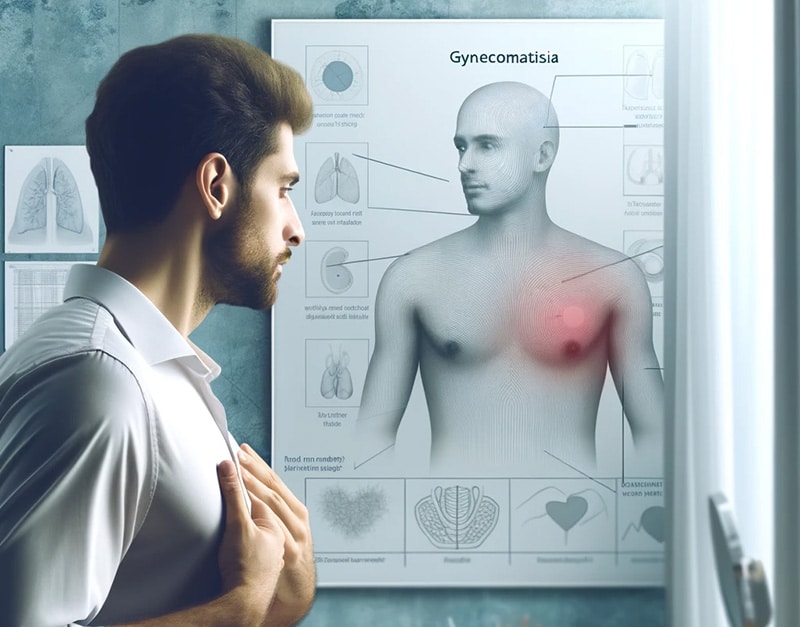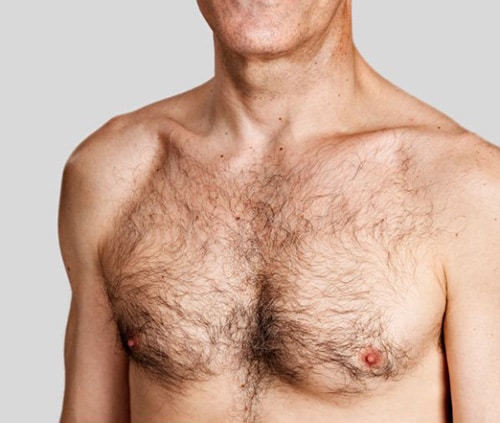Is Gynecomastia Reversible?
Written by: Dr. Dahlia Rice. Posted in: Blog

Let’s cut to the chase: For most men who have gynecomastia, surgery is not the ideal solution. While yes, gynecomastia surgery in Chicago is highly effective, safe, and successful, it also requires anesthesia, incisions, and a substantial price tag. For this reason, we are often asked by patients: “Is gynecomastia reversible?”
In other words, is gynecomastia reversible without surgery?
This is what we’ll be discussing in the article below. But before we dive in, let’s explore what gynecomastia is and the reasons it occurs.
What Is Gynecomastia?
Gynecomastia is the enlargement of the male breasts. It can occur in both men and boys and is typically characterized by excess breast tissue, fat, and or skin on the breasts. Sometimes, this excess extends upward toward the upper chest and outward toward the upper arms.
In addition, you may have some breast swelling where the nipples and areolae are soft and puffy to the touch. Sometimes, there is a small hard breast growth located beneath either nipple, although this is not always the case. Pain and daily soreness may or may not be present.
Naturally, men often feel self conscious about having larger breasts, not to mention the fact that the issue can also be painful. It can be difficult for some men to take their shirts off in public or to be in intimate situations. This can cause additional psychological problems.
Table of Contents
ToggleWhat Causes Gynecomastia?
Gynecomastia occurs for many different reasons. Most often, the cause is related to a hormone imbalance involving the hormones estrogen (a predominantly female hormone) and testosterone (a predominantly male hormone). Patients either have too much estrogen, too little testosterone, or both.
This hormonal imbalance may be caused by any of the following:
- Certain drugs such as marijuana, heroin, and alcohol
- Medications such as anabolic steroids, aromatase inhibitors, or those used to treat thyroid function
- Herbal products
- Normal hormonal changes (puberty, for example)
- Medical conditions such as prostate cancer, liver disease, male breast cancer, pituitary gland tumors, hyperthyroidism, etc.
- Weight gain and excess body fat
Is Male Gynecomastia Reversible?
The short answer is yes. Gynecomastia is technically reversible without surgery in certain situations. Therefore, if you have gynecomastia (enlarged male breasts), it is certainly worth exploring your condition and prognosis.
The most important question to ask yourself if you would like to avoid surgery for this condition is: Can I stop what is causing my gynecomastia?
In some cases, for example, if your gynecomastia is caused by a medication you’re taking, if you stop taking that medication (or switch to a different medication that does not cause enlarged breasts), you may be able to stop and possibly even reverse the gynecomastia you’ve been experiencing.
Likewise, if you have a medical condition that is causing gynecomastia, if you’re able to treat this issue using a therapy, medication, or combination of treatments, you may also be able to reverse your gynecomastia.
Finally, if your gynecomastia is caused by overall weight gain, this may also mean that your gynecomastia is reversible. Basically, here, you would simply need to start losing body fat with diet and exercise or another workable method.
Just remember that when it comes to treating gynecomastia via weight loss, if your weight gain was significant enough, the excess fat and glandular tissue you had may have actually stretched out the skin on the breasts. Therefore, if you were to lose weight, you may be left with hanging excess skin, which you would then likely want to treat with a plastic surgery to excise the loose skin (and possibly also remove additional excess fat with liposuction).
When Is Gynecomastia Not Reversible?
If you have breast enlargement that is affecting one or both breasts, you need to find out what is causing the excess glandular breast tissue before knowing if it can be reversed. In some cases, the issue causing the gynecomastia is not reversible or it has already ceased, and the damage is done — in other words, you can’t reverse the breast development that already happened.
This may happen with any of the aforementioned causes of gynecomastia. Sometimes, even if you stop using certain medications, stop using illicit drugs, get treatment for a medical condition, or lose weight, you still need surgical treatment to get rid of gynecomastia.
Moreover, if your gynecomastia is the result of a natural physical change — such as a reduction of circulating testosterone at a certain age or simply going through puberty — it’s really a waiting game. For most of these patients (most pubescent males, for example), the gynecomastia will go away on its own. However, if it does not, which sometimes occurs, you may want to speak with some board certified plastic surgeons to have a physical examination and discuss your options for surgery.
FAQ: Male Breast Reduction
Is drug-induced gynecomastia reversible?
Sometimes yes, and sometimes no. If possible and safe, you can talk to your doctor about stopping or changing a medication that is causing gynecomastia for you. If you are using illicit drugs, get
the help you need to stop taking these drugs.
In either situation, give it a “wait and see” period after you cease the drug(s). Sometimes, your gynecomastia will clear up, and the effects can be reversed. If not, you’ll want to discuss your options for gynecomastia surgery.
Is gynecomastia from finasteride reversible?
Yes, it can be in some cases. If you stop using finasteride early enough, some experts say that any gynecomastia that occurred since taking the drug can be reversed. Speak to your doctor to learn
more.
Learn More at a Consultation Appointment
Want to learn more about gynecomastia and gynecomastia surgery? Contact us today to schedule a personal consultation appointment with board certified plastic surgeon Dr. Dahlia Rice in Chicago.


